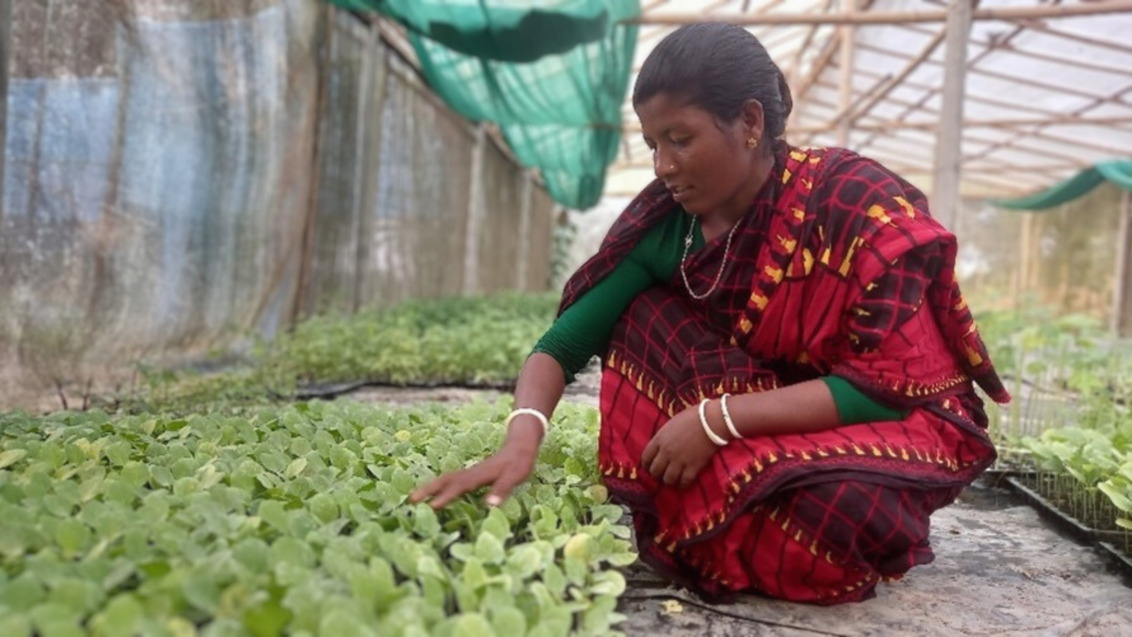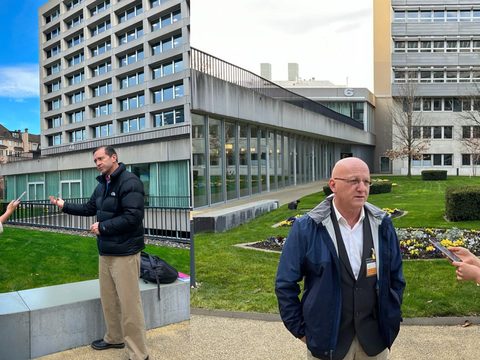Tereza transforms her life with trays

In rural Bangladesh, many families’ only source of income are the father’s small earnings. Financial problems are frequent. Poverty is a particular challenge in indigenous communities. The Santals are one of the oldest and largest such communities in the northwest. They are heavily dependent on agriculture, and thus extremely vulnerable to natural disasters and climate change. Many Santals are landless, illiterate and poor. But change is possible.
Difficult times
Tereza Kisku got married when she was 15. Her husband jobbed as a seasonal farm laborer. His earnings often barely covered their daily necessities. Sometimes there was only enough food for one meal per day. But even in such tough times, Tereza would not compromise on her children’s education. When the story below started, the two elder daughters were in Years 10 and 6; their younger sister was in primary school.
From worries to success with a Farmers’ Hub
Deeply worried by her family's financial problems, Tereza Kisku was looking for a way out of poverty. In mid-2017, she heard about the ChESTA project, and about the possibility of becoming an entrepreneur, running a Farmers’ Hub (FH) in her village. She spoke with field staff from GBK Enterprise Ltd. (GBK-E), who were helping run the Hub network, and enrolled. Tereza attended training by SFSA Bangladesh and was keen to start her business. But where, she wondered, could she find the capital to get going?
Tereza Kisku sought advice from the GBK-E employees and decided to sell one of her cows. The money enabled her to set up Kutulpur Farmers’ Hub in Birganj near Dinajpur. She started on a tiny area of land with 200 trays for vegetable seedlings. She sold the first 60,000 seedlings for 120,000 taka (about $1100) and made a 30% profit. Tereza gradually increased her area for seedling production. Today, Kutulpur FH produces 400,000-600,000 vegetable seedlings annually in 1350 trays. Average monthly income is between $550-$650 – about the price of a small cow. That is five times more than a garment worker’s monthly salary and eight times what her husband used to earn.
The Hub now has two branches on 0.2 hectares, ten times the original size. Tereza employs two female neighbors to help with production. Her husband has stopped seasonal day laboring, and now works at the Hub. At peak times, the elder daughters also lend a hand. The family is now financially stable enough to afford nutritious food and the children’s education. Tereza can also save some money to cover unexpected events.
Digital tool gives business control
Tereza Kisku runs her business digitally. She uses eFarmersHub to record costs, transactions, and revenue, and to print invoices. The tool provides daily Profit & Loss reports and helps her make business decisions. A customer list is combined with payment and inventory status. Tereza also uses eFarmersHub to order material from GBK-E, making it easy to plan and track her purchases. Available on Android, the tool also functions offline.
The story so far…
Tereza now serves more than 1500-2000 smallholders in her district. She not only sells seedlings but also provides advice on cultivation and harvesting. Her tips help the farmers reduce their crop protection use and to ensure safe food production. As well as leasing extra land, Tereza has repaired her house. Her next plans are to increase her buying and selling portfolio, for example adding machinery. This expansion should boost her income and improve service to the farmers.
"My Farmers’ Hub has made a big impact on my life. It gives me economic freedom and I’m now digitally skilled. I want to expand the business further and create more employment for women."
Tereza Kisku

